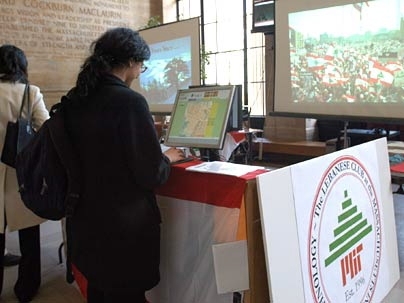With flags flying high, two full-sized screens dedicated to history and facts about Lebanon, free desserts for everyone and 3-D photo books, the Lebanese Club of MIT celebrated history and heritage last week.
Each year, the club gathers in Lobby 10 to celebrate Lebanese Awareness Week, but this year the club was also commemorating both the 30th anniversary of the start of the Lebanese War on April 13, 1975, and the life of former Prime Minister Rafik Hariri, who was assassinated in February.
"This time, this year, we are doing a little more than usual," said Loai Naamani, president of the club.
During the week of April 11-15, the club ran a booth in Lobby 10 for two days, offering free baklava and sfouf, a yellow dessert with sesame seeds. Initially drawn to the food, hundreds of students, faculty and staff spent time listening to the music and watching a biography of Hariri that played throughout the afternoon. Visitors were also invited to look through the three books of photography that were set up on a long table.
"Some students know about the history of Lebanon, but many do not," Naamani said.
One book could be viewed with 3-D glasses to give a full-spectrum view of Lebanese sights. Another contained photos of postwar devastation paired with photos of the same sites after reconstruction.
Naamani credited Hariri with most of the positive changes and said his loss was devastating to many in Lebanon. In fact, a record 35 percent of the population--1.2 million people--demonstrated in Beirut after the assassination, he said.
"There is a call for unity," said Naamani who grew up in Lebanon and whose family still lives there. "We are trying to live that unity here as well," he said.
In addition to the booth, which was open April 13 and 14, the club also organized a trip to the National Day of Unity dinner on the evening of April 13, sponsored by the Lebanese Community of Greater Boston. "Three hundred to four hundred people came to the dinner," said Naamani. And, on April 14, The Harvard Kennedy School Arab Caucus held a presentation on Lebanon and the Middle East.
Naamani termed the week a success. "Many people knew very little about Lebanon," he said. Each year, the club hopes to educate people, he added.






